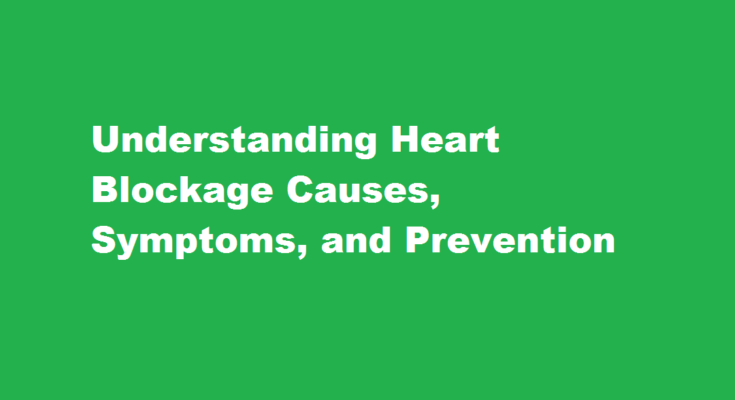Introduction
Heart blockage, also known as coronary artery disease, is a serious condition that affects millions of people worldwide. It occurs when the blood vessels supplying the heart muscle become partially or completely blocked, restricting blood flow and oxygen delivery. Recognizing the signs and symptoms of heart blockage is crucial for early detection and timely medical intervention. In this article, we will delve into the causes, symptoms, and preventive measures to enhance your understanding of this condition.
Understanding the Causes
Heart blockage is primarily caused by the buildup of plaque within the coronary arteries. Plaque is a combination of cholesterol, fat, calcium, and other substances that accumulate on the artery walls. Over time, the plaque hardens and narrows the arteries, reducing blood flow. Some common risk factors for heart blockage include a sedentary lifestyle, smoking, high blood pressure, high cholesterol levels, diabetes, obesity, and a family history of heart disease. Uncontrolled stress and an unhealthy diet rich in saturated and trans fats can also contribute to the development of heart blockage.
Recognizing the Symptoms
Heart blockage may manifest through various symptoms, which can range from mild to severe. It’s important to note that some individuals may not experience any symptoms at all, which highlights the importance of regular check-ups and preventive measures. Common signs of heart blockage include chest pain or discomfort, known as angina, which can be characterized by a squeezing, pressure-like sensation in the chest. This pain may also radiate to the arm, shoulder, neck, jaw, or back. Shortness of breath, especially during physical activity, dizziness, fatigue, rapid or irregular heartbeat, and fainting are also potential symptoms.
Prevention and Management
While certain risk factors for heart blockage, such as family history, age, and genetics, cannot be controlled, adopting a healthy lifestyle is crucial for prevention and management. Here are some key strategies
- Maintain a balanced diet Emphasize whole grains, fruits, vegetables, lean proteins, and healthy fats. Limit the intake of saturated and trans fats, salt, and added sugars.
- Engage in regular physical activity Aim for at least 150 minutes of moderate-intensity aerobic exercise or 75 minutes of vigorous activity per week. Consult with your healthcare provider before starting any exercise program.
- Quit smoking Smoking damages blood vessels and significantly increases the risk of heart blockage. Seek professional help or join cessation programs if needed.
- Manage stress Chronic stress can contribute to heart disease. Practice relaxation techniques like meditation, deep breathing, or engaging in hobbies to alleviate stress.
- Control underlying health conditions Manage conditions such as high blood pressure, diabetes, and high cholesterol levels through regular check-ups, medication, and lifestyle modifications.
- Maintain a healthy weight Aim for a body mass index (BMI) within the recommended range. Losing excess weight can reduce strain on the heart and improve overall cardiovascular health.
Frequently Asked Questions
How can we know about blockage in the heart?
A completely blocked coronary artery will cause a heart attack. The classic signs and symptoms of a heart attack include crushing chest pain or pressure, shoulder or arm pain, shortness of breath, and sweating. Women may have less typical symptoms, such as neck or jaw pain, nausea and fatigue.
What are the frequently asked questions about heart health?
What questions should I ask my doctor about my risk of heart disease? How does my family history affect my heart health? Is my blood pressure reading normal? What is my cholesterol level and how does this affect my heart?
Conclusion
Understanding heart blockage is essential for early detection and prevention. By adopting a healthy lifestyle, managing risk factors, and recognizing the symptoms, individuals can take proactive steps to reduce the risk of heart blockage and promote overall heart health. Remember, it is always advisable to consult with a healthcare professional for personalized guidance and treatment options.
Read Also : A Comprehensive Guide to Checking Your PF Balance



